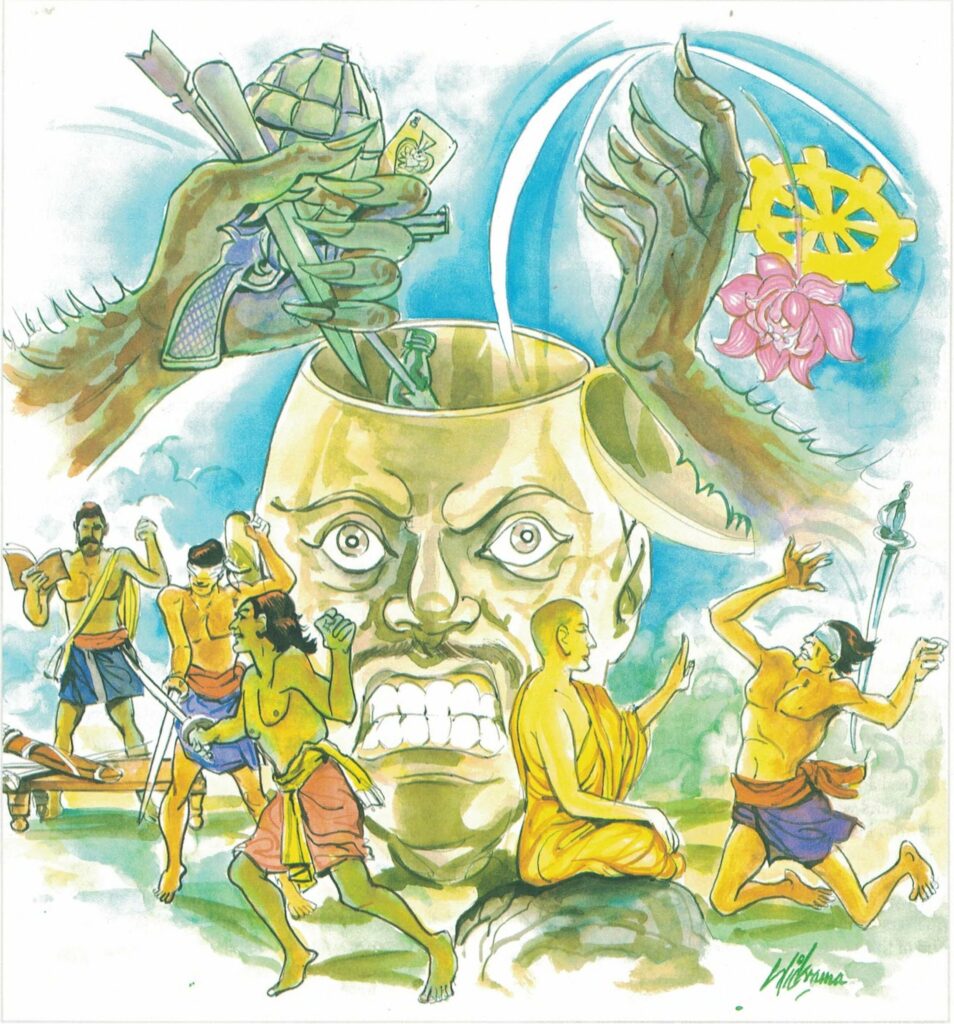Pali text, illustration and English translation of Dhammapada verse 72:
yāvadeva anatthāya ñattaṃ bālassa jāyati |
hanti bālassa sukkaṃsaṃ muddhamassa vipātayaṃ || 72 ||
72. Truly to his detriment skill is born to the fool; ruined is his better nature and scattered are his wits.

The Story of Saṭṭhikūṭa-Peta
While residing at the Veluvana Monastery, the Buddha spoke this verse, with reference to a snake-ghost named Saṭṭhikūṭa.
Once upon a time, there lived in Benares a cripple who was an adept at the art of slinging stones. He used to sit at the city-gate under a certain banyan-tree, sling stones, and cut the leaves of the tree. The boys of the city would say to him, “Make an elephant for us, make a horse for us;” and he would make every animal they asked him to. As a reward he received from them food both hard and soft. One day, as the king was on his way to the pleasure-garden, he came to this place. The boys left the cripple within the shoots of the banyan-tree and ran away. Now it was noon when the king stopped and went in among the roots of the tree, and his body was overspread with the chequered shade.
“What does this mean?” said he, looking up. Seeing leaves cut in the forms of elephants and horses, he asked, “Whose work is this?” On being informed that it was the work of the cripple, he sent for him. Happy with the cripple’s service the king gave him the eight-fold gifts, and four fine large villages, north, east, south, and west of the city.
Now a certain man, observing the worldly prosperity won by the cripple, thought to himself, “This man, born a cripple, has won great prosperity through this art. I also ought to learn this art.” He learnt it.
Now at that time a solitary Buddha named Sunetta resided in a shelter of leaves and grass near the city. When the man saw him enter the city through the gate for the purpose of receiving alms, he thought to himself, “This man has neither mother nor father. If I hit him, I shall have no penalty to pay; I will try my skill by hitting him.” So aiming a stone at the right ear of the solitary Buddha, he let fly. The stone entered the solitary Buddha’s right ear and came out of his left ear. The solitary Buddha suffered intense pain, was unable to continue his almsround, and returning to his shelter of leaves through the air, passed into Nibbāna.
The people said, “This wicked fellow says that he hit the Private Buddha. Catch him!” And straightaway they beat him and then and there killed him. He was reborn in the Avīci Hell. Until this great earth was elevated a league, during all that time he suffered torment. Thereafter, because the fruit of his evil deed was not yet exhausted, he was reborn on the summit of Vulture Peak as a sledge-hammer ghost.
Explanatory Translation (Verse 72)
bālāssa ñattaṃ anatthāya yāva eva jāyati,
bālassa muddhaṃ vipātayaṃ assa sukkaṃsaṃ hanti
bālāssa: by the ignorant; ñattaṃ [ñatta]: what is learned; anatthāya yāva eva: only to his harm; jāyati: (is) conducive; bālassa: of the ignorant person; muddhaṃ [muddha]: head; vipātayaṃ [vipātaya]: cuts off; assa sukkaṃsaṃ [sukkaṃsa]: what ever good is in him; hanti: destroys
Whatever is learned by the ignorant is conducive to harm. It brings about his own downfall. Misplaced learning destroys whatever potential a learner possesses and renders him useless in terms of real knowledge.
Commentary and exegetical material (Verse 72)
ñattaṃ: knowledge. This stanza emphasizes that even the knowledge of the foolish person brings about his destruction. Knowledge needs such other refinements as capacity to use it so that no harm is done to oneself and others. The foolish people though they may acquire some skill are devoid of the wisdom to use it properly.